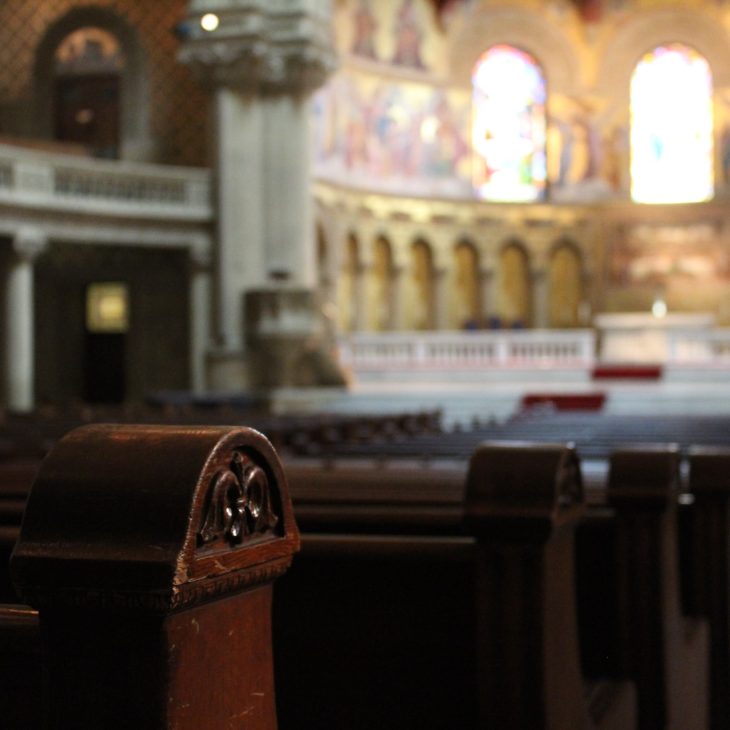Post-Election, Campuses Are Building Spaces to Heal
November 23, 2020

An uproar of joy and jubilation could be heard across Howard University on Saturday afternoon.
It was November 7, and official news just broke that Joe Biden and Kamala Harris had won the election. Howard, a private federally chartered historically black university (HBCU), is Harris’s alma mater. Crowds of students rushed to the White House and the campus grounds, where they hadn’t been for months due to the pandemic, to celebrate the news.
“It was euphoric, especially for Black women, to witness one of our own succeed, in this manner, and break this glass ceiling,” says Nisa Muhammad, assistant dean for religious life at Howard. “There’s a collective sigh and everyone’s coming together to be involved and support the Biden-Harris team. But before that, we all need a moment to breathe and process.”
This sentiment of pausing to take a breath and offering support, space, and resources for people to process and heal post-election is echoed across campuses around the nation.
Stanford University is focusing on building ‘communities of belonging’ for its students, especially for those who belong to marginalized and minority communities.
“Communities of belonging are community centers, cultural centers, faith groups, student organizations – they are places where people can bring their full authentic selves,” says Tiffany Steinwert, dean for religious and spiritual life at Stanford.
Steinwert explains that since this election season has been so divisive and hurtful for people, especially for people of color, she fears that hosting large campus-wide post-election spaces could be dismissive of people’s vulnerabilities and would not be a safe space for everyone. She believes the focus should instead be on nurturing relationships and spaces for students to be vulnerable with the people they trust, and address the wounds and pain points the election season has exposed to different communities.
“This election has once again revealed the deep wounds of racism our nation carries,” says Steinwert. “And there is no quick vaccine to white supremacy. Students, especially those from marginalized communities and those impacted by the hate, are exhausted, and they want something concrete to hold on to. They don’t want big Zoom calls on how to save America’s soul, no empty rhetoric, no false hope.”
She adds, “Of course there is hope, and change is coming, but we need to be persistent and be the instruments for change. Right now, we need to acknowledge that we are all exhausted. If we don’t, and we dive straight into large post-election narratives and plans, the same people who are nurturing these wounds are the ones who will get left out.”
Frank Shushok, Jr., vice president for student affairs at Virginia Tech, calls this moment a great time for design-thinking.
“Our current design is obviously not working if there’s so much room for hateful rhetoric and racism,” says Shushok. “We need to design spaces where people can feel safe and have difficult dialogues, only then can we think about what to do next, and how to move forward to build a better nation.”
VT Student Affairs is working with various campus partners, like VT Engage: The Center for Leadership and Service Learning, Office of the Vice President, Hokie Wellness, etc., to offer discussion sessions, workshops, wellness strategies, constructive dialogue skills, and other resources for the campus community to process post-election feelings.
Some of the events are designed specifically for students to reflect on the election results and find common ground with other students, while other sessions offer campus-wide community spaces to express their election emotions through expressive art or learn how to practice self-care and meditation.
“Some people are celebrating, while others are mourning, and we wanted to create spaces where everyone has a place to express their emotions before we come together to ask – what’s next?” says Shushok.
The focus on the mental and spiritual wellbeing of the community is also a central theme in post-election work across campuses. At Syracuse University in New York, the Hendricks Chapel invited Krista Tippet, the Peabody award-winning broadcaster and creator of The On Being Project, to speak with the chapel dean, Rev. Brian Konkol.
Their conversation, “After the Election: Spirituality, Civil Conversations, and Social Healing,” focused on the role of trust, joy, healing, hope, and listening, in the post-election environment. The conversation was a part of the ‘Matters that Matter’ virtual series hosted by the Hendricks Chapel, which brings local and national thought leaders together in conversation with Dean Brian Konkol to discuss critical matters facing society.
“The first act of love is to listen, and to listen not simply with the intent to respond, but to listen with the intent to understand,” says Konkol. “When we listen, we recognize that we can have significant disagreements, whether they’re religious, spiritual, or political, and still be committed to creating a shared life together where communities can flourish.”
Konkol adds that considering the conflicting nature of the election season, and the results, campuses should focus on trying to transform the conflicts, not so much on resolving it.
“It’s like a fire. The goal is not to put out the fire, the goal is to recognize hey, this fire can either heat the house up or burn the house down,” says Konkol. “So, at this moment, why not we, people of diverse religious, political, moral, and ethical perspectives, build a fireplace together. Let’s heat the house together and transform the energy of conflict in ways that are giving to us all.”
Share
Related Articles
American Civic Life
Is This a Time for Bridgebuilding? 5 Leaders in Conversation
American Civic Life
Higher Education



